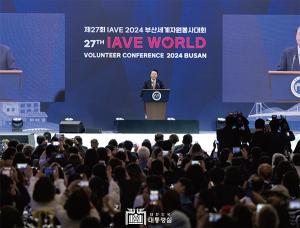 |
||
Yoon attended the APEC CEO Summit and gave a keynote speech and attended the IPEF summit
During his visit to San Francisco on the sidelines of the APEC Summit, President Yoon delivered a keynote speech at the APEC CEO Summit event on November 15, laying out the direction of cooperation to enhance interconnectedness in the APEC region in the areas of trade, investment, supply chain, digital, and future generations, and expressing Korea's commitment to contribute to APEC as a global pivotal economy. He praised APEC's success in reducing regional trade barriers and strengthening member economies' capacities, and called for an expanded role for APEC as a guardian of the multilateral trading system. He emphasized that resilient supply chains are at the core of the multilateral trading system, and suggested that strengthening supply chain resilience be a priority for APEC, including sharing member economies' experiences and establishing an early warning system within APEC. He explained that in order to realize the era of digital deepening, where connectivity and immediacy are key, data must flow unhindered across borders, the digital divide between countries must disappear, new norms and orders are needed, and social, cultural and geographical characteristics, as well as the level of economic development among member states, must play an important role.
 |
He said South Korea also plans to actively participate in international discussions on establishing digital norms, building on the Digital Bill of Rights announced in September. The APEC CEO Summit was attended by nearly 1,200 business leaders and scholars from across the APEC region, including President Yoon and the leaders of APEC member economies such as the United States, Vietnam, Peru, Thailand, and Chile, as well as speakers such as Visa Chairman Alfred Kelly, Qualcomm President Cristiano Aron, Microsoft CEO Satya Nadella, and WTO Director-General Ngozi Okonjo-Iweala. Yoon also attended the IPEF summit held in San Francisco, USA on the occasion of the APEC summit. The meeting was attended by the heads of state (India was the minister) of 14 participating countries, including U.S. President Joe Biden and Japanese Prime Minister Fumio Kishida. The leaders of each country highly praised the fact that agreements were reached in three out of four areas in a short period of time, including the supply chain agreement concluded in May, followed by the clean economy agreement and the fair economy agreement. They agreed to form the ‘Core Minerals Dialogue’ to establish a stable core mineral supply chain so that IPEF can function as a platform to respond to new issues, and the ‘IPEF Network’ to promote human exchanges between participating countries. They also agreed to expand cooperation on energy security and technology, and to hold a summit every other year and a ministerial meeting every year, laying the foundation for IPEF to achieve sustainable results. It is expected that the summit and conclusion of negotiations will significantly increase the resilience of the Indo-Pacific region supply chain. They also agreed to promote new investments of $155 billion by 2030 in the clean energy sector.
 |
Yoon visits the UK as a state guest at the invitation of King Charles III and holds a summit with British Prime Minister Rishi Sunak.
President Yoon, who made a state visit to the United Kingdom at the invitation of King Charles III, held a summit meeting with British Prime Minister Rishi Sunak at the Prime Minister's Office on November 22 and discussed a wide range of practical cooperation plans between the two countries, regional situations, and global issues. Before the meeting, the two leaders viewed the original copy of the Treaty of Amity and Commerce between the two countries (1883), which opened the door to diplomatic relations between the two countries 140 years ago. They evaluated that the two countries have developed deep relationships across various fields, including politics, economy, science and technology, and culture. They agreed to upgrade the bilateral relationship from a "comprehensive and creative partnership" to a "global strategic partnership" and discussed ways to strengthen bilateral cooperation in all fields.
 |
Through this, it is hoped to expand cooperation to create a free, open, and secure cyberspace, strengthen bilateral defense competitiveness through a joint defense export MOU, and lay the foundation for effective cooperation to enter the common market. The two leaders said they hope to expand cooperation to establish trade norms in new fields such as digital, supply chain, and energy through improvements in the Korea-UK FTA. The two leaders recognized that the signing of the "Digital Partnership" and the "MOU on Digital Government Cooperation" between the two countries have paved the way for further cooperation in digital areas such as 6G, AI, and digital norms. As South Korea is a leading AI technology holder, Yoon called for the two countries to work closely together in the process of shaping global AI norms and governance, and both leaders expressed their expectations that the MOU on space cooperation will serve as an opportunity for the two countries to become key partners in the space sector in all areas, including space exploration, policy, and industry. They agreed to strengthen cooperation on climate change action and energy transition for sustainable development, and to support global efforts to combat climate change through the Carbon Free Energy initiative, the establishment of a bilateral clean energy partnership, and contributions to the GGGI, and to contribute together to the achievement of the SDGs. They also said that with the revision of the working holiday arrangements, the age of participation will be raised and the quota will be expanded, which they hope will encourage interaction between young people, which is the basis of future cooperation between the two countries. They signed the Downing Street Accord after the summit.
백종원 기자 bridgekorea@naver.com







